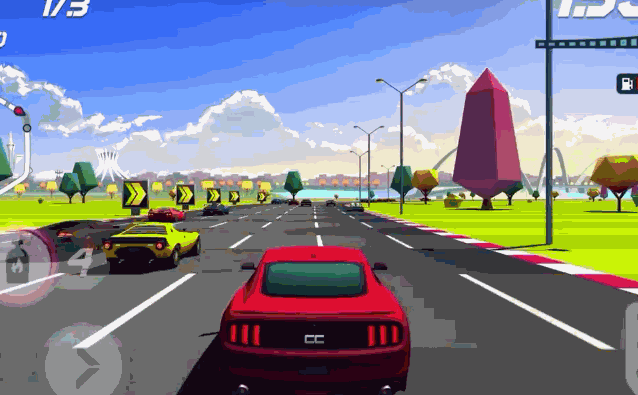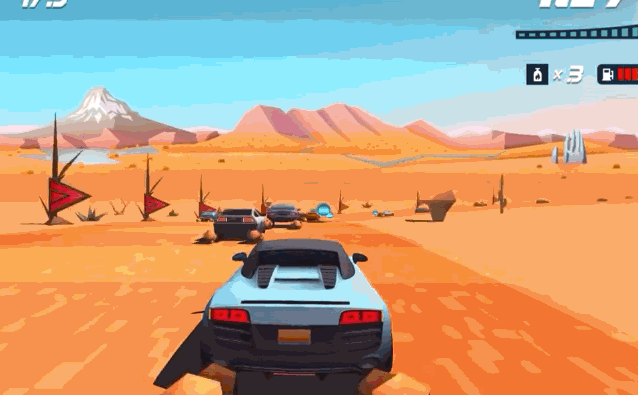“Can you do the same thing you did back then, but make it modern and better?”
That was the gist of a speculative email Barry Leitch, a Scottish musician, received from Amilton Diesel of the Brazilian game studio Aquiris on March 1st of this year. Having become obsessed with a soundtrack to Top Gear the 45-year-old Leitch composed back in 1992, they tracked him down and asked if he’d be willing to commandeer the sonics for a retro-styled iPhone racing game they were working on. They called it Horizon Chase.
Leitch was suspicious at first: “I didn’t even know people in Brazil made games,” he admits. More so, despite claiming the soundtracks to nearly 250 titles dating back to his 1986 debut with I.C.U.P.S. on the Commodore 64 home computer, Leitch had transitioned away from the video game industry and spent much of the 2000s crafting music for toy companies like Fisher Price. Still, after speaking to Diesel and his team, he found himself convinced by their earnest enthusiasm towards his music, which is characterized by cascading synth riffs and adrenaline-spiking tempos. Leitch signed on to the project and delivered the first demo of what would become Horizon Chase‘s title track four days later.
“I expected to get three or four pages of diatribe about changes I should make,” he says after submitting the song, “like switch the bass drum or replace all the guitar sounds, all the usual shite you get. Instead I got a two word email back: ‘Fucking awesome.’”
Since its release last month, Horizon Chase—which bills itself as “a love letter to retro racing fans” and openly cops to homaging ’80s and ’90s outings like Out Run, Rush, and Lotus Turbo Challenge—has been met with a warm wave of critical approval; the app snagged an Editor’s Choice spot on the Apple Store. But more than the high-octane, twisting and turning thrills that unfurl as you zip around the world in a series of souped-up sports cars, it’s Leitch’s soundtrack that has emerged as the game’s endearing motif. Fueled by fan reaction to the music, an album release will now take place in October, while a remix contest is running, judged by a mix of artists with roots in the videogame world and deejays active on the Brazilian dance scene. Horizon Chase is the three-buck mobile app that has brought Leitch’s music into a new era and to a new audience—while also proving that retro doesn’t have to be kitschy and cliched.

Speaking via Skype from his studio in a rural town in northwest Ohio, where he moved eight years ago, Leitch reclines in his desk chair and muses on the throwback basis of his music. As a jump-off point for Horizon Chase, he admits he “totally went back to where I left off, starting with the keyboard arpeggio going up and down the scales, and even using the same sort of chord progression in the Top Gear title songs.” But then he adds, “I decided to go nuts from there; I started to throw in some dubstep and add all these extra layers of guitars.”
There’s an expansive feel to the old-to-the-new vibe Leitch settled on, especially when pitched against the sort of 16-bit ditties he was pumping out around the turn of the ’90s. “Obviously the technology has evolved fantastically,” he explains of the difference, “but maybe the best way to describe it is, the stuff I wrote now is the same as back then, but this is finally how I imagined it sounding in my head 20 years ago. Two decades later, you can finally get the music to sound like how you wanted it.”
Firing up Horizon Chase testifies to Leitch’s characterization. It’s not a soundtrack for timid listeners. You’re greeted with “Horizon Chase Title Theme,” a song that quickly builds into a wailing wave of screeching synth lines, snapping electro-hand-claps, and seething guitar riffs. If you played the music out loud in the claustrophobic confines of public transport, your fellow frustrated strap-hangers would be well within their rights to politely brutalize your phone. Other songs in Horizon Chase, like the unabashedly melodramatic “Jentay” and the butch, synth-propelled “Vyper” follow suit. They flirt with a love-or-hate switch inside us. But after time—and especially when experienced in tandem with the game itself—the tracks reveal a true and tender heart.
As you careen around sun-blissed sandy courses in the Atacama Desert, or attempt to bump and bungle your way through a gridlock of competing cars under a swirl of fluorescent Northern Lights in Reykjavik, the melodies mirror the thrill of your movement. Sailing past a competitor to snag first place against the triumphant blare of in-your-face digitized horns feels like an Olympic moment. Sound and action coalesce completely.

Asked why his music seems to both drum up and heighten the idea of speed and momentum, Leitch first shrugs it off by saying only, “I like fast-paced music and I like a good melody.” But then he tells an anecdote that took place during the playtesting process of Horizon Chase: “I’m working through the levels and realize there’s three tunes that haven’t played. I start emailing the [Aquirius] guys, saying, ‘Fuck, where’s my tunes?’ Then eventually I get to the Acropolis and that big heavy guitar plays and the lightning is coming down and the rain comes in and it’s such a hard track with so many curves.” A pause. “It just works.”
Crucially, the Horizon Chase music works without relying solely on nostalgia. Sure, the surface sheen of the soundtrack links to the composer’s past, but the slick and expansive execution scoops you up into a broader flight of fantasy that’s happening in the moment. Leitch’s sound resonates as revivalist more than retro; it takes a core template from days gone by but retools it for modern ears. It’s a cyclical ploy the music industry has long mined, like with the Daptone-inspired funk movement that filtered across to Amy Winehouse’s chart-topping exploits, or even Mark Ronson’s recent ‘80s electro-funk shenanigans with Bruno Mars.
The allure of holding on to a nostalgic memory can be very quickly—and even cruelly—dashed by wholesale revisiting it; most times, it’s better to update the formula while still paying homage. It’s a trick Barry Leitch and Horizon Chase have pulled off like a charm.
